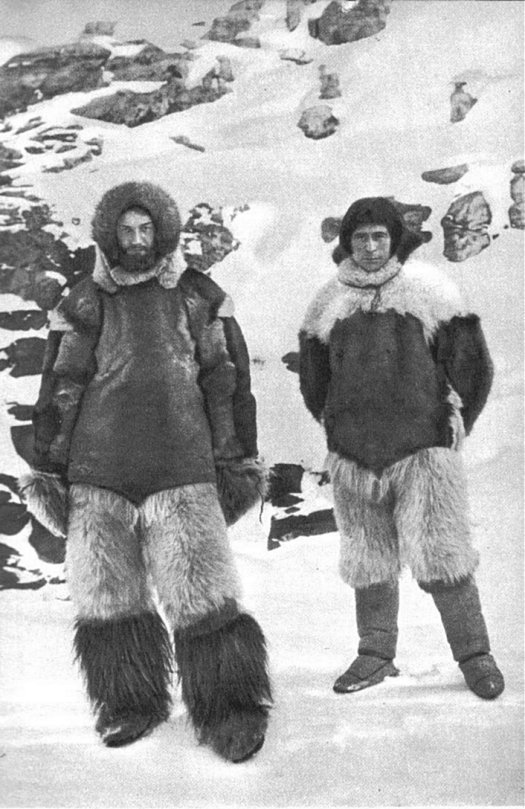
The explorer and ethnologist Peter Freuchen (1886–1957) spent a large part of his life in Northern Greenland, exploring it in depth, trading with Inuits and making friends with them. He even married an Inuit girl, Navarana. Living in the most hostile environment in earth, Inuits held a very pragmatic point of view on many matters. In particular, they considered marriage as an economic and family association between a man and a woman, based on solidarity, but without any commitment to conjugal fidelity in relation to love or sex; often men lent their wives to other men, or borrowed their wives, or swapped wives with them, for purely utilitarian motives; they could also see their wives prostituting themselves to Europeans as a good business. Such exchanges were generally decided by husbands; as hunters feeding their family, they considered themselves as superior to women. Inuit men were basically macho, proud of their manly ways.
Nevertheless, romantic love could exist among some Inuits, as Freuchen recounts so well in his book Arctic Adventure — My Life in the Frozen North (Echo Point Books & Media, 2013):
High up in the nunatak we came upon old abandoned huts. Asayuk told me of desperate men who had run away from home and gone into the mountains to get away from their fellow men. They became ghosts or were taken by the Inland people, the Eqidleet. He told me from his own experience of one such person, a man who was driven mad by a woman.
It is funny, but it is told, he said—and Asayuk was known to speak only the truth, that there are men born who care for one particular woman, and it takes them seven years to forget her. A certain young man had taken a girl from her family and lived with her at Inglefield Gulf. He made himself conspicuous by speaking of her when out hunting with other men. When they stayed out overnight and all slept together, he regretted that he could not be at home with his wife, and even mentioned her name without shame on several occasions. At last some of the dignified hunters remonstrated with him. It is well known that a man who reveals such dependence upon a woman is likely to offend the seals, as they do not care to be hunted by inferior persons. Therefore, he was told either to stay at home and sew and care for the lamps or employ his mouth for the talk of men.
But the poor boy persisted. Then one day a big hunter with many children to care for lost his wife. And while the hunter could have taken a widow experienced in housekeeping, he thought it would be amusing to take the young man’s wife and see if he dared fight for her.
The frantic young husband did his best, but he was not permitted to kill the hunter as that would have been too great a loss to the tribe. He was advised to use his arms and strength, or depend upon the speed of his dogs to recapture her. Instead, he did nothing but sit upon a stone for three days and cry like a baby. Even his wife said to the other women that he had left his dignity behind in the tent where they had lived.
When the young man saw her laugh and chide him for his weakness, he determined to live no longer with his people; he went inland and became a qivitoq—a ghost who may never return home.
He was seen once from a distance, but as those who saw him felt he was about to approach, they fled. He had not been heard of for many years until a hunter went upcountry for caribou, and found his dead body in a small hut.
Asayuk had known the young man and told me that he was only a boy, but he remembered that the other men had kidded him because he was never willing to lend his wife or borrow other men’s wives.
This is the story of a man who died because of his belief in one, and only one, woman!
I went to look at the abode of this Arctic Romeo, and saw that he had had scant room for mourning. His hut was made of stone and peat, and the animal bones about the floor indicated that he had kept alive for a considerable length of time. Asayuk told me that no one had wanted to bury him and his head had lain on the ground for several years until some of his relatives relented enough to put it in a grave. We saw the grave; cruel Nature had been sufficiently touched by his love to grow flowers of many colors about his stone pile.
Previously published on Agapeta, 2017/01/22.

